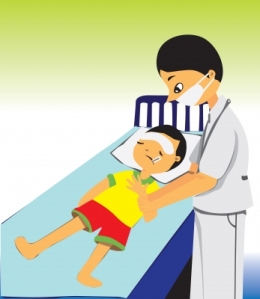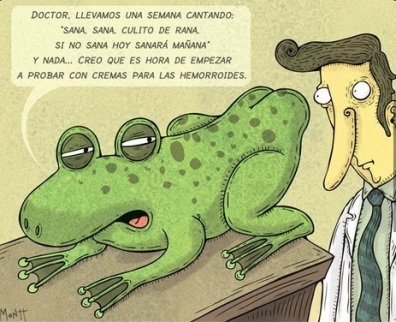As we continue playing catch-up with my newspaper columns from the past few months, here’s the next installment from The Bogotá Post: being sick in (but never of!) Colombian Spanish. Much of the information can also be found in this post that I wrote in 2012. And if you don’t know what chikungunya is, look it up–I didn’t choose that sickness because it has a cool name but rather because it regularly pops up on the Colombian news (also written chicunguña).
Last week I felt a cold coming on, a friend had to cancel lunch plans because he too had come down with something, and one of my boyfriend’s cousins was also feeling under the weather. It seemed like a great excuse to write about how to talk about feeling sick in Colombian Spanish, so, from the sniffles to chikungunya, here’s how to cope, Spanish-wise.
I’m sick is Estoy enfermo (think of sending someone to the infirmary), but a very common way in Colombia to say that you’re feeling bad is Estoy maluco or Me siento maluco. The noun form of this adjective is maluquera: Tengo una maluquera also conveys that you’re feeling lousy. Tengo un malestar is more formal way of saying the same thing. Estoy indispuesto is a more formal and elegant way of saying that you’re sick and out of pocket, like saying, I’m ill. I’ve never found a convincing way of saying that someone feels sick as a dog in Colombian Spanish, but you can compare how bad you feel to what it must feel like to have the plague: Tengo una peste horrible, Tengo la peste, or Estoy apestado.
So, what do you have? A cold? The flu? Here in Colombia and in some other countries, these are treated as pretty much the same animal: la gripa. Note that it’s gripa and not gripe, as it is in most countries. So, you say Tengo gripa, or Estoy agripado, or Me dio gripa. I caught a cold. Resfriado or catarro–common words for a cold in other countries- are not words you’re likely to hear in Bogotá.
Medicines are called medicamentos far more than they’re called medicinas, and you can also say drogas or remedios. Pills are almost always called pastillas, not píldoras. You can see that pastillas is the diminutive form of pastas, so if you hear someone ask for pastas at the farmacia or droguería, there’s no need to tell them that the Italian restaurant is around the corner.
¡Que te mejores! is your standard way of telling someone to get well soon. If you know that someone was sick and you want to check in on them, you can ask them ¿Cómo sigues? or, more specifically, ¿Cómo sigues del ojo/estómago? or whatever body part was ailing them.
Losing your voice is always a pain in the neck, and economy of words becomes of the utmost priority. When this happens, you’ll say, estoy afónico. Estar ronco means that your voice is hoarse. Tener carraspera is another way of saying this, kind of like saying that you have a frog in your throat.
Speaking of frogs, there’s this great little rhyming chant in Spanish that parents say to little kids when they get a boo-boo and think that the world is going to end: Sana que sana colita de rana, si no sanas hoy sanarás mañana. Basically, get better, little frog tail, if not today, then tomorrow.
What are the best local remedies to take when you get a cold in Bogotá? Their versions of chicken noodle soup include: aguapanela with lemon and cinnamon, honey with milk, and the like.
There are many old wives’ tales here that revolve around not mixing hot and cold, for fear of causing anything from a cough to crippling you permanently. Some examples are not opening the refrigerator right after coming home all hot and sweaty after exercising, or not running your hands under cold water right after ironing. You and I might roll our eyes, but Colombians take this folk wisdom extremely seriously.
People also tend to be a little OCD about cold air. Quick, quick, close that window; you’ll let el chiflón in! El chiflón being a draft that can have all kinds of pernicious effects. And don’t go from a warm inside environment to the cold outdoors unprepared, or you risk the danger of el sereno, or, a deadly chill. Very much talked about as a sort of bogeyman, the dreaded sereno is also infamous for increasing the effects of alcohol on the brain. Don’t say I didn’t warn you.
May you never have the need to use any of this vocabulary, but it’s always good to have it in your back pocket just in case. Make sure you’re always properly bundled up (especially your feet), if not for your own wellbeing then at least for the sensibilities and concern of the Bogotanos around you. When in Rome…



Estoy enfermo is one of the first phrases you learn when traveling in Mexico…after estoy cansada and tengo hambre… Also known as a hangover…
When it comes to irrational fear of cold drafts, Colombians sound exactly like my Mother! When I was looking after her it was always a negotiation just to open a window. The house would get so stuffy that I couldn’t breathe. What I call fresh air, she called a draft…like you were letting in the plague! She was from the old country so I wonder if that could have something to do with it. Old folk wisdom or old wive’s tales?
LikeLike
Hola Vocabat. Mi nombre es Mauricio Aldana. Soy profesor de la Institución Universitaria Colombo Americana UNICA. Una de las clases que dicto es La Enseñanza del Español como Lengua Extranjera. Mis estudiantes y yo disfrutamos mucho de las columnas que escribes. Tienes un estilo muy agradable y accesible. Nos permite tener una visión desde la otra orilla, por así decirlo, de nuestra lengua. Me gustaría saber si estás interesada en visitarnos alguna vez. Nos gustaría hacerte unas preguntas acerca de tu experiencia en el aprendizaje/enseñanza del español y tu experiencia en el país. La idea es tener una suerte de “cross-pollination session”. Algo muy informal que sé que puede tener un impacto positivo en mis estudiantes. Gracias.
LikeLike
Hola Mauricio,
Muchas gracias por tus palabras tan amables. Me alegra mucho saber que mis columnas han sido de provecho para tus estudiantes, nunca se me había ocurrido la posibilidad de un lectorado así. Me parece tu idea; por favor mándame un correo a la dirección que se encuentra en la sección de “About” y hablamos.
LikeLike
Sana que sana colita de rana…? Ha, another really old expression. So funny to see it. About the gripa, I think depending on the severity, there options that you give are not always interchangeable (I do realize that there are usage differences in different groups of people). If it is not too bad then you talk about a resfriado. Few people would know if they actually have influenza, so this is not something you hear in Colombia.
This made me think of how things are in the States. People do say that they have “the flu” when they really just have a cold. Maybe in recent years, with all the talk about the real flu, this has changed. I am not really sure if it has changed in the general population. It is quite interesting that people would choose a specific, and very nasty, virus and relate a relatively mild illness to it. About a year ago, one of the top female marathoners in the world (multiple winner of the Chicago and Boston marathons, among others) tested positive for EPO, a performance-enhancing drug. The usual first reaction of an athlete in these cases is to come up with an explanation for the positive test, often an implausible and funny explanation. This woman was from Kenya, and she said that she had taken something because she had malaria. I was very puzzled by this, and tried to make sense of the statement, until I read that in Kenya when the get a cold they say that they have malaria (I don’t know if this is true, btw). At first I laughed and then I realized that we call it the flu here, which is not any better :)
Long story. Sorry.
LikeLike
Love your blog. Just a couple comments on this post. I’ve got a friend in Cali who I chat with and she says “gripe” (not gripa). My wife, however says “gripa” I’ve never heard her say gripe. My Calena friend does use the word medicamentos a lot. “que te mejores” in my mind is short for “espero que te mejores” or “ojala que te mejores”, they’re basically tossing out the verb and just saying the last part. “me siento maluco” indeed is used a lot, but I’ve never heard anyone use the word “maluquera”, maybe it’s a regional thing? (my wife and her family are from the Valle del Cauca). The English equivalent of “como sigues” is “how are you getting along” which is not an uncommon way for someone in America or England to ask if you’re getting better or not. aguapanela is water with panela. Panela is some sort of unprocessed sugar, or something like that, I’m not exactly clear even though I’ve had it a lot. I never bothered to find out. For the word hangover, Colombians say “guayabo”. Regarding flu, my wife and her family don’t say “flu”, they talk about “dengue.”
LikeLike
Hi Michael,
So sorry to be getting back to you in such a tardy fashion. Thanks for your comment!
How are you getting along? is an excellent translation for Cómo sigues? that preserves the feel- very nice. And that’s very interesting about dengue for flu. My boyfriend said that that usage is heard on the coast.
I plan to get back to blogging regularly in 2016 and hope to hear more from you!
LikeLike